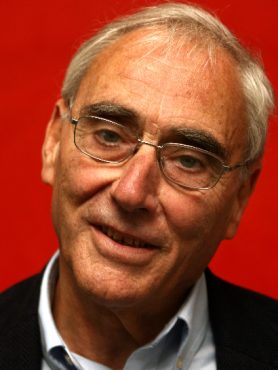Intervenant
Pierre DOCKÈS
Associate Member - Cercle des économistes

Present positions
- Professor emeritus at the University Lyon 2
- Researcher in the laboratory Triangle (UMR CNRS)
Positions’ held
- Professor University Lumière Lyon 2,.
- He was nominated honorary member of the European Society for the History of Economic Thought (ESHET) in 2014.
- He founded the “Centre Walras » (now “Triangle” and he directed this research center until 2000), a research Center on History of Economic Thought. He heads the team that publishes the complete works of Léon Walras.
Education
- Faculté de Droit et des sciences économiques Lyon
- École de commerce de Lyon
- Aggregation in 1969
Books
- Medieval Slavery and Liberation, Chicago: Un. of Chicago Press, 1982
- L’histoire ambiguë, Paris : PUF 1988 (avec Bernard Rosier).
- Le Sucre et les Larmes. Bref essai d’histoire et de mondialisation, Paris : Descartes & Cie, 2009.
- Jours de colère. L’esprit du capitalisme, avec Francis Fukuyama, Marc Guillaume et Peter Sloterdijk : Paris : Descartes et Cie, 2009, 159 p. (the authors received the “prix spécial Turgot”, awarded in 2010).
- Hobbes. Economie, terreur et politique, Paris : Economica, 2008, 282 p.
- L’Enfer, ce n’est pas les autres ! Bref essai sur la mondialisation, Paris : Descartes & Cie, 2007, 156 p. (the author received the “prix du livre d’économie”, awarded by the Senate on November 24, 2007.)
- Pouvoir et autorité en économie, Paris : Economica, 2000.
- With Jean-Hervé Lorenzi, he was editor (and an author) of Fin de Monde ou sortie de crise, Perrin, 2009 and Le choc des populations : guerre ou paix, Perrin, 2010.
- Le capitalisme et ses rythme Les faits, les théories : quatre siècles en perspective. T. I, Sous le regard des géants, Paris : Classiques Garnier, 2017.
Economic fields of expertise
With Bernard Rosier, he tries to identify a « ambiguous » theory of history and studies the economic rhythms (crises, long waves, cycles). During the 2000s, he worked on the role of power in economy and on the relationship between innovations and conflicts, hence also his reading of Thomas Hobbes, theorist of power that anticipates some contemporary theories. More recently, his work focused on the sugar economy in a long historical perspective (from colonial slavery to contemporary forms of exploitation, marketing and consumption) and he wrote a little book where he tries to focus on the potential of the French economy in globalization. He has just completed the first volume of a monumental work on the history of crises, business cycles and economic mutations since the late seventeenth century to the present and the analysis of these rhythms by contemporary theories.
Contributions
L’impact des révolutions sur les inégalités_DOCKES




















































































